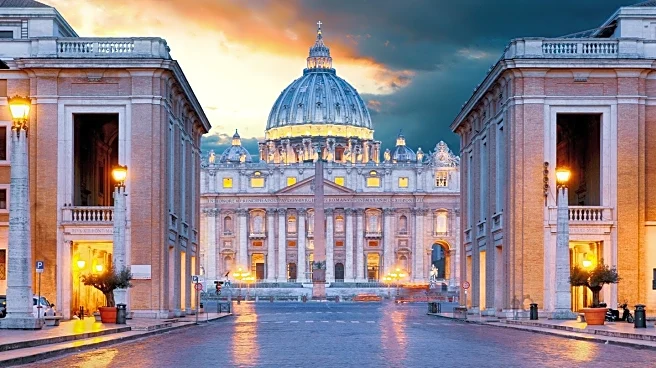What is the story about?
What's Happening?
Pope Leo XIV inaugurated the Borgo Laudato Si' Advanced Training Center at the Vatican's summer residence in Castel Gandolfo, Italy. This initiative aims to transform Pope Francis' environmental teachings into practical applications. The center spans 55 acres and focuses on sustainable farming, vocational training, and environmental education. It is designed to serve as a model of ecological stewardship and spirituality for the Catholic Church and beyond. The center will host student groups, CEOs, and others, offering courses on organic farming and regenerative agriculture. The facility is powered by solar panels, bans plastics, and employs recycling and composting systems to achieve zero waste. It also includes a vocational school providing training in sustainable gardening and organic winemaking, targeting vulnerable groups such as victims of domestic violence and refugees.
Why It's Important?
The inauguration of the Borgo Laudato Si' Advanced Training Center represents a significant step in the Vatican's commitment to environmental stewardship. By integrating sustainable practices into its operations, the Vatican sets a precedent for religious and secular institutions worldwide. This initiative aligns with Pope Francis' encyclical 'Laudato Si',' which emphasizes the moral imperative to care for the planet. The center's focus on vocational training for vulnerable groups highlights the social dimension of environmental sustainability, offering new job opportunities and fostering community resilience. The project also aims to influence business leaders by promoting sustainable economic growth, potentially leading to broader adoption of eco-friendly practices in various industries.
What's Next?
The Borgo Laudato Si' Advanced Training Center will begin hosting educational programs and workshops, attracting diverse groups interested in sustainable practices. The Vatican plans to reinvest profits from the center's products, such as organic wine and olive oil, into further educational initiatives. As the center gains traction, it may inspire similar projects globally, encouraging other religious and educational institutions to adopt sustainable models. The Vatican's approach could also influence policy discussions on environmental issues, emphasizing the role of faith-based organizations in promoting ecological responsibility.
















